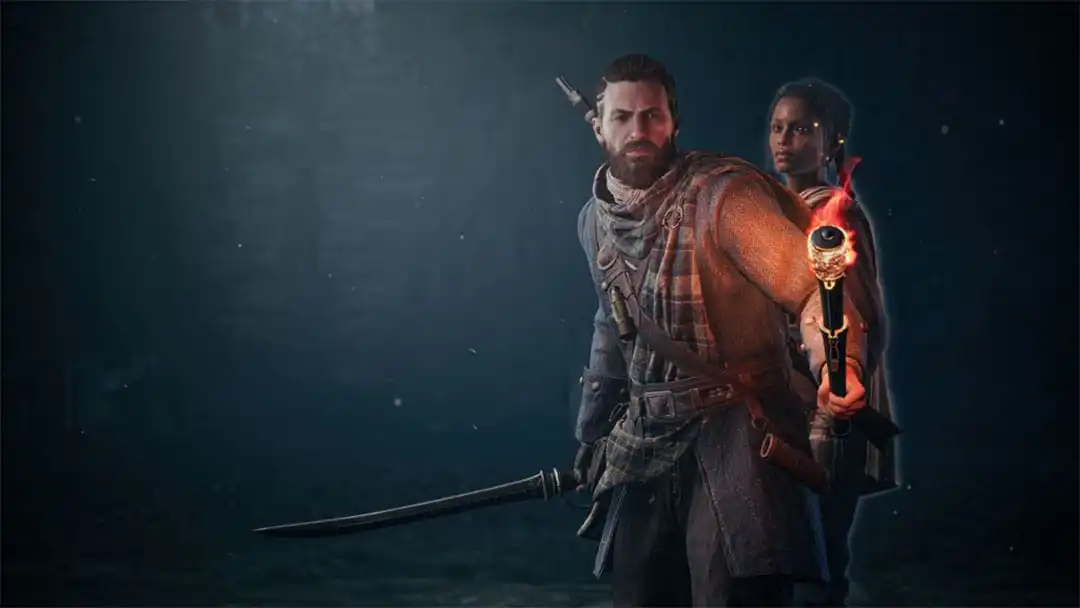Introduction to Banishers: Ghosts of New Eden
‘Banishers: Ghosts of New Eden’ is an action role-playing game (RPG) that immerses players in a fantastical realm where the supernatural intertwines with deeply personal narratives. Set in a richly developed world known as New Eden, this game presents an environment steeped in mystery, populated by spectral beings and laden with moral quandaries that challenge the player’s decisions throughout the gameplay. The unique premise of ‘Banishers’ revolves around the intricate task of ghost hunting, a central theme that propels players into engaging encounters with both ethereal and corporeal foes.
The gameplay mechanics of ‘Banishers’ emphasize a blend of exploration and action, allowing players to traverse diverse landscapes while confronting the challenges that arise from the ghostly inhabitants of New Eden. As players navigate through its visually captivating environments, they wield an array of combat techniques, magical abilities, and tactics that facilitate encounters with a variety of spectral entities. This combination of action and strategy keeps players engaged as they uncover the underlying stories attached to each ghost they encounter.
Moreover, the aesthetic elements of New Eden are noteworthy. The game features a distinctive art style that enhances its thematic depth, utilizing a palette that reflects the somber and haunting atmosphere permeating the world. The visual representation of ghosts and their interactions with the environment adds layers of complexity to the narrative experience, elevating the emotional stakes associated with each decision players must face. These aspects not only create an engaging backdrop for the ghost hunting but also underscore the moral implications inherent in the choices players will make as they navigate the intertwined fates of the living and the dead.
The Art of Ghost Hunting in New Eden
In “Banishers: Ghosts of New Eden,” the art of ghost hunting is an intricate blend of skill, strategy, and understanding of the game’s nuanced environments. Players are thrown into a world teeming with restless spirits, and to succeed, they must employ a variety of methods and tools tailored for spirit confrontation. A central aspect of ghost hunting involves scouting the environment, where players can uncover hidden elements that may signify the presence of ghosts. This requires keen observational skills and a willingness to explore every corner, ensuring that no potential leads are ignored.
Character abilities play a crucial role in the effectiveness of ghost hunting. Each character is equipped with unique skills that can aid in locating and confronting spirits. For instance, certain abilities may allow players to interact with ethereal phenomena or unveil ghostly paths. Leveraging these skills strategically can enhance the player’s effectiveness during ghost encounters. Furthermore, players must learn to adapt their approach based on the characteristics of the ghosts they face. Some spirits may respond to aggressive tactics, while others could require a more nuanced and empathetic approach.
The interactive environments in New Eden also contribute significantly to the thrill of ghost hunting. Players can manipulate their surroundings, using items and artifacts found within the game to either trap or pacify certain spirits. These engagements not only enrich the gameplay but also foster a sense of discovery, as players untangle the lore behind each ghost. Understanding the significance of ghost lore is essential for players, as it adds layers of context to their hunting endeavors and enhances emotional engagement with the narrative. By immersing themselves in this lore, players come to appreciate the moral choices they must make, establishing a deeper connection with both their characters and the spectral entities inhabiting this rich universe.
Moral Choices and Their Impact on Gameplay
In “Banishers: Ghosts of New Eden,” players are continually faced with a variety of moral choices that profoundly affect their gameplay experience. Throughout their journey, the decisions made by players regarding the fate of ghosts and their ethical interactions with non-playable characters (NPCs) create a rich narrative tapestry. Each choice carries weight, leading players to reflect on their values and the consequences of their actions within the game’s immersive world.
As players navigate the complex landscape of New Eden, they are presented with dilemmas that challenge their perceptions of morality. For instance, deciding whether to banish a ghost or offer it solace introduces a significant ethical question regarding the value of a spectral life. Such decisions not only dictate the immediate fate of these apparitions but also influence the broader environment and lore of the game. The player’s alignment with various factions, determined by these moral choices, plays a critical role in shaping character relationships and story dynamics.
Furthermore, the ramifications of these decisions extend into character development. Each interaction with an NPC can lead to different outcomes, including forming alliances, inciting conflicts, or altering character arcs altogether. For instance, an approach that emphasizes empathy may lead to unexpected support from certain characters, while a more ruthless strategy could result in hostility and isolation. Thus, players must weigh the potential consequences of their actions carefully, understanding that their choices could shift the balance of power within New Eden.
The impact of moral choices in “Banishers: Ghosts of New Eden” highlights the significance of player agency in shaping the narrative. As the story unfolds, the distinctive outcomes stemming from these ethical decisions weave a personalized gameplay experience, compelling players to consider not only their strategies but also the moral implications of their journey through this haunting world.
Conclusion: The Duality of Banishers’ Experience
In Banishers: Ghosts of New Eden, players are immersed in a world where the thrilling pursuit of ghost hunting is consistently juxtaposed with complex moral dilemmas. This duality lies at the core of the game’s appeal, inviting players to engage not only with the excitement of the hunt but also with the weighty implications of their choices. As players navigate through the haunted landscape, they encounter spectral entities that challenge not only their ability as hunters but also test their ethical compass.
The game’s design fosters a deeper engagement through its narrative structure, which underscores the consequences of every action taken. Each encounter with a ghost is not merely a quest for victory but a reflective moment that resonates with questions of morality and ethics. As players decide whether to banish these ethereal beings or engage with them compassionately, the decisions ripple through the narrative, altering the gameplay experience and the players’ emotional investment.
Ultimately, Banishers: Ghosts of New Eden seeks to redefine the player’s relationship with their in-game choices. It emphasizes that each act of banishment or mercy comes with profound significance—transforming the experience from mere entertainment into a pathway for introspection. This focus on moral complexity is likely to leave a lasting mark on the genre, prompting future titles to explore similar themes. The legacy of Banishers may well influence how players perceive narratives within gaming, encouraging them to appreciate the weight of their decisions and to engage in a richer dialogue about morality in video games.

